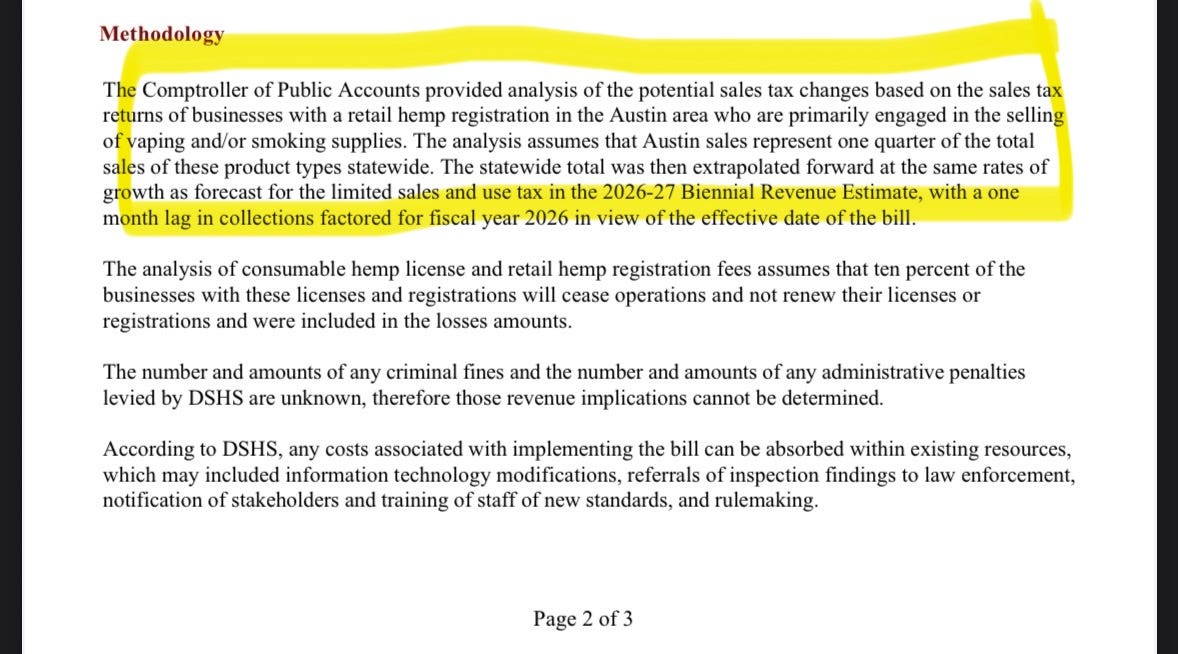Texas THC Tangle: How SB 3’s Supporters Fumbled with a Flawed Fiscal Report
On March 2, 2025, Jerry McGinty, director of the Legislative Budget Board, presented a Report for Senator Charles Perry’s SB 3, a bill to ban most hemp-derived cannabinoids except CBD and CBG. Released during the 89th Texas Legislative Session, the report projects a $19.27 million General Revenue loss for the 2026–2027 biennium, escalating to $11.69 million by 2030. SB 3’s supporters, enamored with these figures, argue that banning THC products like delta-8 is fiscally sound. But the report’s reliability is dubious, severely underestimating Texas’s THC revenue.
SB 3 is Perry’s bold move to rein in Texas’s hemp market, banning all consumable hemp products except CBD and CBG, tightening testing and labeling rules, and dishing out harsh penalties: third-degree felonies for crafting THC edibles and Class B misdemeanors for selling hemp near schools. The Department of State Health Services (DSHS) becomes the hemp sheriff, tossing out $10,000 fines like confetti. The LBB’s fiscal note, the supposed backbone of this plan, forecasts a $9.04 million loss in 2026, $10.23 million in 2027, and growing deficits through 2030, with cities losing $1.62 million in 2026 alone.
SB 3’s champions wave this note as proof the ban won’t break the bank. But the report’s foundation numbers grossly misrepresent the revenue which can be generated from thc sales, misjudging the cash THC products pour into Texas.
The LBB’s fiscal note, built with input from the Comptroller and DSHS, is a case study in miscalculation. Here’s where it goes wrong:
1. Austin as Texas’s Hemp Hub? Nope.
- The report leans on sales tax data from Austin’s hemp retailers, mostly vape shops, assuming Austin represents 25% of Texas’s hemp market. It then projects statewide losses using the 2026–2027 Biennial Revenue Estimate with a one-month lag for 2026.
- Why It’s Off: the report only used Austin’s market. Using it to represent Houston’s sprawl or rural Panhandle farms is like saying a single taco truck defines Texas cuisine. The report overlooks major markets like Harris and Bexar counties.
2. Vape-Only Vision
- The analysis fixates on vaping and smoking products, sidelining edibles, tinctures, and delta-8 gummies.
- Why It’s Off: THC edibles and oils are Texas’s cash cows, with the state’s hemp market likely worth hundreds of millions annually. Ignoring these is like judging a rodeo by the popcorn stand. Nationally, the 2023 hemp-derived cannabinoid market hit $2 billion, with Texas leading due to legal gaps.
3. The 10% Closure Guess
- The report assumes 10% of hemp businesses will close under SB 3, with no data to back it up.
- Why It’s Off: This figure ignores businesses pivoting to CBD or going underground. It’s as if the LBB thinks hemp shops will fold faster than a bad poker hand instead of adapting.
4. Fines? Never Heard of ’Em
- The note dismisses revenue from DSHS’s $10,000 fines and criminal penalties as “unknown.”
- Why It’s Off: SB 3’s hefty penalties—felonies for THC brownies, misdemeanors near schools—could generate millions, especially in enforcement-heavy cities like Houston. Ignoring this is like overlooking a gushing oil well.
5. One-Size-Fits-Texas Fallacy
- The report applies Austin’s data to all 254 counties, ignoring Texas’s urban-rural divide.
- Why It’s Off: Austin’s hemp scene doesn’t speak for Dallas’s dispensaries or Harris County. This blanket approach is laughably simplistic.
Why the Report Misses Texas’s THC Goldmine
- Market Misstep: Delta-8 and delta-9 products drive a massive Texas market, yet the report’s vape focus lowballs revenue losses.
- Austin-Centric Bias: Major markets like Houston and Dallas, plus rural hemp farming, are ignored.
- Agricultural Oversight: SB 3’s testing rules could crush hemp farmers, but the report stays silent.
- Black-Market Blind Spot: Texans might turn to online vendors or neighboring states if THC is banned, skewing loss estimates.
Fixing the Fiscal Flop
To make the LBB’s note credible, state lawmakers should have included:
1. Statewide Survey: Collect data from Houston, Amarillo, and beyond, not just Austin.
2. Full Hemp Spectrum: Include edibles, oils, and all THC products, using DSHS retailer data.
3. Regional Breakdown: Analyze urban, suburban, and rural impacts separately.
4. Count Fines: Estimate penalty revenue based on similar laws, like tobacco enforcement.
5. Business Insights: Survey hemp businesses on closures or adaptations, ditching the 10% guess.
6. Consumer Impact: Study how SB 3 affects buyers and small businesses, especially in underserved areas.


